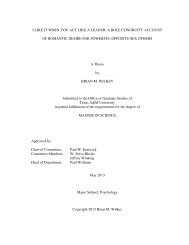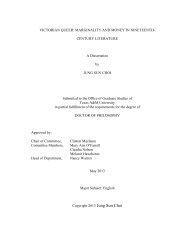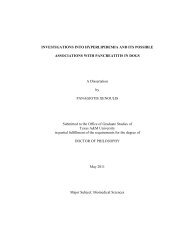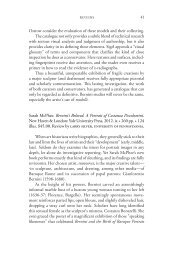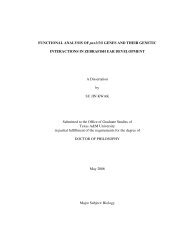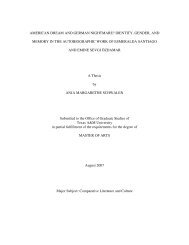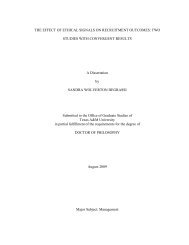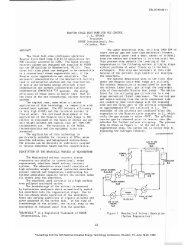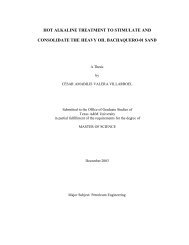A Dissertation by GRACE HUI-CHIN LIN Submitted to the Office of ...
A Dissertation by GRACE HUI-CHIN LIN Submitted to the Office of ...
A Dissertation by GRACE HUI-CHIN LIN Submitted to the Office of ...
Create successful ePaper yourself
Turn your PDF publications into a flip-book with our unique Google optimized e-Paper software.
y more than one respondent. That is <strong>to</strong> say, <strong>the</strong> recognized <strong>the</strong>mes were significant<br />
and could not be ignored because <strong>the</strong>y were not a single individual’s opinions or<br />
biased concepts.<br />
Themes Emerged from Students’ Perceptions about <strong>the</strong> Topic Avoidance Strategy<br />
This study revealed that <strong>the</strong> seven respondents made a connection between<br />
“politeness” and “keeping silence” in <strong>the</strong>ir interviews. Students at Tunghai<br />
University mentioned that it is important <strong>to</strong> consider politeness in communication.<br />
Although <strong>the</strong>y agreed that changing <strong>to</strong>pic was necessary, <strong>the</strong>y did not support <strong>the</strong><br />
technique <strong>of</strong> “keeping silence.”<br />
Sung Ru mentioned politeness was her habit since she was a pupil. Sung Ru<br />
believed that being patient was obliga<strong>to</strong>ry when encountering trouble in a <strong>to</strong>pic.<br />
Cheng Chih suggested that using “polite language” <strong>to</strong> change <strong>the</strong> <strong>to</strong>pics might be a<br />
better skill than just “keeping silence.” Jiun Sheng was embarrassed if he kept his<br />
silence, so he proposed that at least “Mmm…,” or “Ohh….” sounds needed <strong>to</strong> be<br />
articulated in order <strong>to</strong> inform <strong>the</strong> speaker that <strong>the</strong> <strong>to</strong>pic was not attractive. Jain Guo<br />
suggested gradually, ra<strong>the</strong>r than <strong>to</strong>tally, changing a <strong>to</strong>pic was a strategy he would use.<br />
He believed ignoring an ongoing <strong>to</strong>pic might not be appropriate in communication.<br />
Additionally, Ling Mei perceived that she politely had <strong>to</strong> say “I might not<br />
like this <strong>to</strong>pic” or “I have a need <strong>to</strong> change this <strong>to</strong>pic” when asking <strong>to</strong> change <strong>the</strong><br />
<strong>to</strong>pics. Pei Pei addressed that she needed <strong>to</strong> be polite when changing <strong>to</strong>pics,<br />
especially in an international situation or a formal situation. Pei Pei’s opinion about<br />
politeness in communication was that <strong>the</strong> requester should say, “Excuse me” or “I am<br />
sorry” before expressing his/her need <strong>to</strong> change a <strong>to</strong>pic. More than two cases had<br />
implied an indirect way <strong>of</strong> requesting a change in <strong>to</strong>pic should be a more appropriate<br />
161




